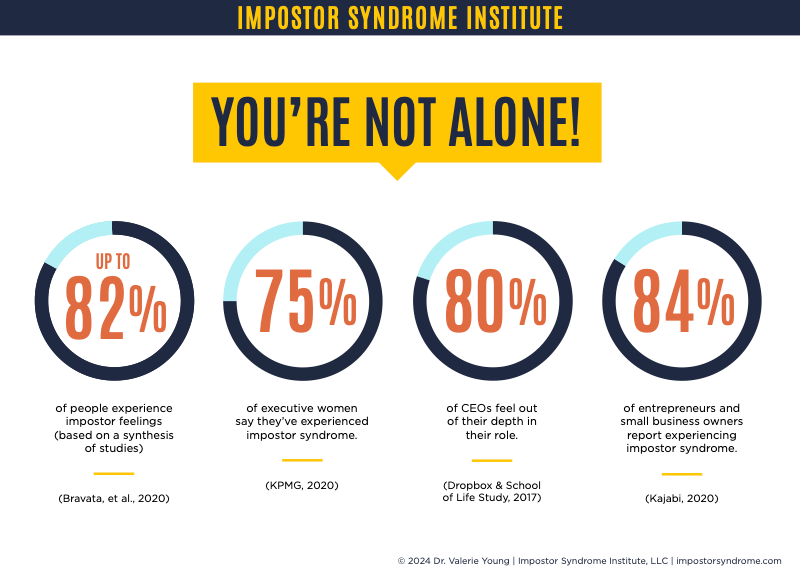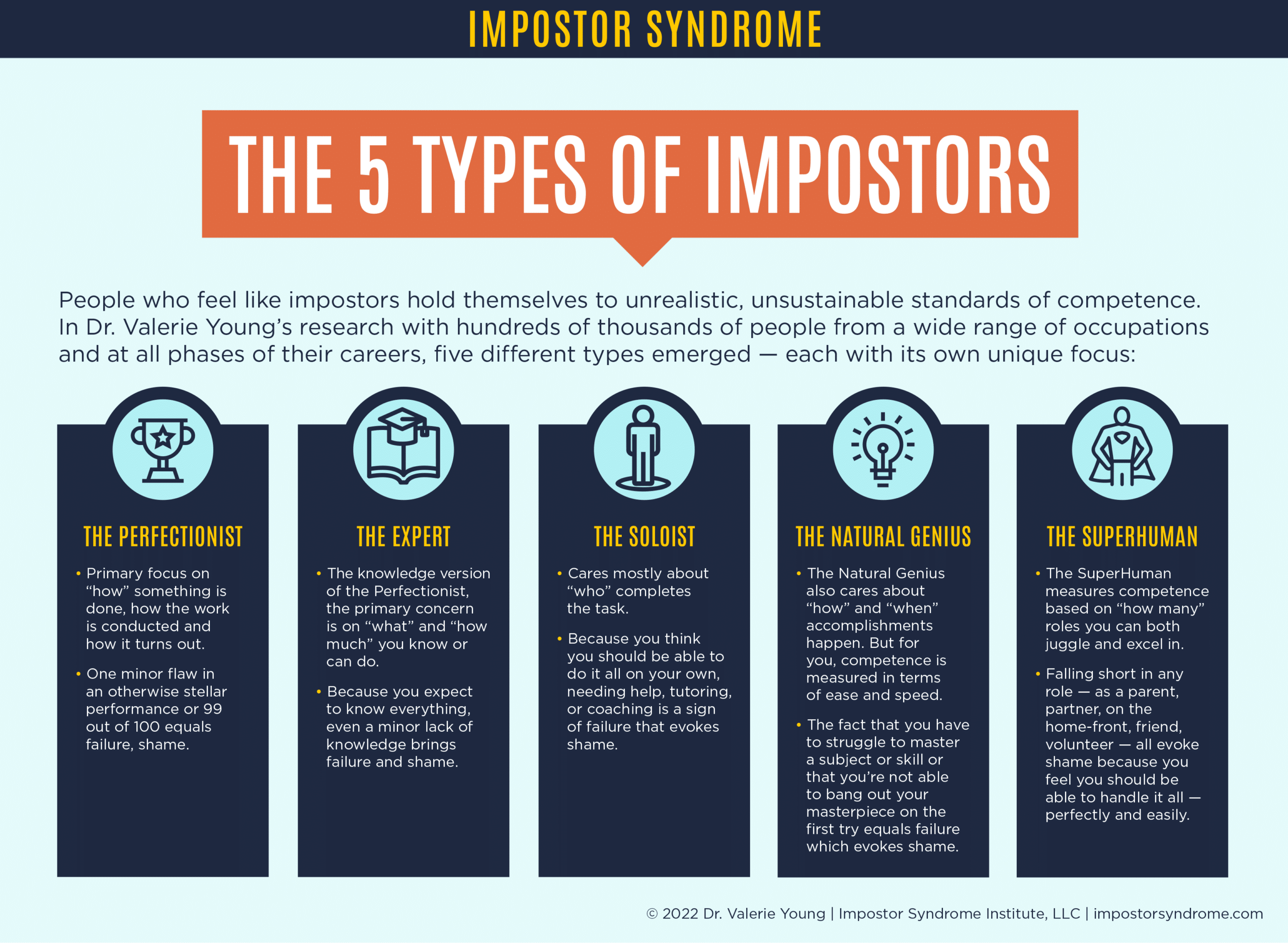Part 1: Understanding Impostor Syndrome and The Five Types of Impostors
Learn more about what it means to have impostor syndrome, the five subtypes, and the consequences of letting impostor syndrome influence your decisions.

I was standing backstage in a beautiful auditorium surrounded by some of Edmonton’s best and brightest—entrepreneurs, academics, researchers, activists, philanthropists—all there to accept the 2017 annual Top 40 Under 40 award.
Oh, and me.
As I stood in the line, I chatted with the exceptional people in front and behind me. All the while, I kept waiting for the stage manager, bustling around with her headset and clipboard, to approach me and tell me there had been an unfortunate mistake. I didn’t belong there and should collect my things and leave.
She didn’t, in fact, tell me any of those things. She told me where to stand and when my cue was to walk on stage. I did as directed, shook the proffered hands, accepted the award as the emcee related why I had been chosen, stood for the photo, and then stepped off stage to join my fellow Top 40s in the audience.
Afterward, I stood with my husband and friends, taking pictures in front of the award banner. I was even asked to sign some of the magazines, which featured each recipient and the full story about why they were a Top 40.
The entire time, I smiled, shook hands, exchanged pleasantries… and felt like a complete and total impostor.
That feeling never completely goes away
I have been an entrepreneur for nearly 15 years. I’ve built multiple businesses, I’m a partner in a software company, I’ve written over a hundred articles, and have newsletter subscribers from over 50 countries worldwide. I have been included as an expert in Huffington Post articles and interviewed on podcasts. From my northern corner of Canada, I’ve connected with people across North America and all the way from England, Ireland, Germany, Columbia, Lebanon, Australia, and several other countries around the world for productivity consulting. I’ve spoken at dozens of events; I even make a living doing it!
But let me tell you a secret… despite all those things, I am also an impostor.
Or at least, these days, I’m a recovering impostor. I still have that Top 40 Under 40 award. They didn’t take it away; it’s sitting on the second-from-bottom cubby of the bookshelf in our living room.
Even now, nearly seven years later, I have mixed feelings when I look at it.
What is impostor syndrome?
Have you ever had that “I’m in over my head, and they are going to find out” feeling? Or maybe felt out of your depth? Like you guessed or BS’ed your way out of a situation? Or like you don’t belong and have only made it this far by sheer luck? Do you ever feel like a phony or a fraud, petrified that, at any time, someone was going to call you on it?
All of that? It’s called impostor syndrome.
Psychologists Pauline Rose Clance and Susanne Imes were the first to study it and defined impostor syndrome as:
“An internal feeling of intellectual phoniness, where, despite professional and academic accomplishments, one still feels as if they are not bright and have fooled anyone who thinks otherwise.”
It’s like having a crappy best friend in your head that says mean things to you. 😅
It’s more common than you think
Also known as imposter phenomenon, imposter experience, and impostorism, the name impostor syndrome is a bit of a misnomer as it’s not a psychological condition or diagnosis.
It is, however, incredibly common! In studies collected by the Impostor Syndrome Institute, 70% to 84% of people experience impostor syndrome at some point in their lives.
Though most often attributed to high-achieving women, impostor syndrome is established across gender, race, age, and a wide range of occupations. This means that “millions of capable people around the world secretly worry they’re not as bright, talented, or qualified as everyone thinks they are”[1].
If you have experienced those feelings? You are in good company:
“I have written 11 books, but each time I think, ‘uh oh, they’re going to find out now. I’ve run a game on everybody, and they’re going to find me out.”
- Maya Angelou. Civil rights activist, author, poet and Nobel Laureate.
“The exaggerated esteem in which my lifework is held makes me very ill at ease. I feel compelled to think of myself as an involuntary swindler.”
- Albert Einstein. Theoretical physicist, considered one of the most influential scientists of all time.
“Now, when I receive recognition for my acting, I feel incredibly uncomfortable. I tend to turn in on myself. I feel like an imposter. Any moment, someone’s going to find out I’m a total fraud and that I don’t deserve any of what I’ve achieved.”
- Emma Watson. Award-winning actress, model, and activist.
Those are just a few people who, even with some of the world's top accomplishments, have experienced impostor syndrome.

The Five Types of Impostors
Dr. Valerie Young, founder of the Impostor Syndrome Institute, further divided impostor syndrome into five groups. You might relate to several of these; see which ones hit home the most.
1. The Perfectionist
As a perfectionist, you set excessively high goals for yourself, and when you fail to reach a goal, you experience self-doubt and worry about measuring up. Perfectionist tendencies show up in things like:
- Micromanaging
- Difficulty delegating because no one will do it as well as you
- Difficulty starting things (waiting for the perfect time)
- Difficulty finishing things (it’s never quite perfect enough)
If you are a perfectionist, you likely always believe you could have done better, which makes it harder for you to celebrate and own your achievements.
2. The Superhuman
The superhuman measures their competence based on how many roles they can perform masterfully. Superhumans:
- Feel as though you should be able to juggle all your responsibilities perfectly
- Experience shame if you are struggling to keep all your balls in the air
If you are a superhuman, you take pride in being “busy” all the time and appearing as though you are handling your many commitments with ease.
3. The Natural Genius
As a natural genius, you judge your competence based on ease and speed instead of effort. Similar to perfectionists, your expectations are impossibly high, and you also expect to get things right on the first try. Natural geniuses:
- Avoid things you can’t be sure you will be good at
- Feel shame when it takes you a long time to master something
If you are a natural genius, you are likely used to excelling, often getting high grades in school, and tend to identify as “the smart one.”
4. The Soloist
As a soloist, you feel that asking for help reveals your phoniness, which means you refuse assistance to prove your worth. Soloists have a hard time asking for help of any kind. When you are a soloist, you tend to:
- Want to accomplish things on your own
- Dislike working with others on projects or tasks
- Feel foolish or incompetent when you do have to ask for help
If you are a soloist, you often spend a lot of time and energy trying to figure something out on your own instead of asking for help.
5. The Expert
As an expert, you measure your competence based on “what” and “how much” you know or can do. Experts never feel like they know enough and will do things like:
- Constantly seek training or certifications to improve your skills in order to succeed
- You won’t apply for a job or role unless you meet every single requirement
- Procrastinate on starting things because they are forever seeking more information
If you are an expert, your biggest fear is to be exposed as inexperienced or unknowledgeable.
Not gonna lie; I think I might have felt like all of these types of impostors at some point!

Why do so many people feel this way?
So, where do these impostor feelings come from?
First, highly skilled people tend to think others are just as skilled as they are. This spirals into feelings like they don’t deserve accolades or opportunities over other people. And worse, as you saw with the famous people listed above, no threshold of accomplishment puts these feelings to rest.
Part of this is a phenomenon called “pluralistic ignorance,” when people mistakenly believe that everyone else holds a different opinion from their own.[2] You doubt yourself privately but believe you are alone in thinking that way because no one else voices their doubts. It’s tough to know how hard your peers work, how difficult they find certain tasks, or how much they doubt themselves, which makes it hard to dismiss the feeling that you’re less capable than the people around you.
The consequences of letting impostor syndrome influence your decisions
Impostor syndrome can be an interesting motivator in that it will push you to excel, work hard, and exceed expectations. It often means you are a high achiever, did well in school, and have found some success in your chosen career. But it’s something that works… until it doesn’t.
It’s the type of motivation that eventually starts to do more harm than good. For example:
- It can stop you from applying for jobs or programs in which you would excel because you don’t meet all the criteria. You are not perfect, or it’s not the perfect time.
- It can make you fly under the radar, not asking for promotions, not raising your hand, not sharing ideas.
- It encourages procrastination, workaholism, and self-sabotage.
Impostor syndrome is a type of fear motivator. You are so afraid of being found out as an impostor that you live in a state of constant dread. It makes you feel anxious, uncomfortable in your own skin, and afraid to be seen and known.
Feeling like an impostor all the time is straight-up crappy.
So, what can you do about it? How do you overcome impostor syndrome?... Check out Part 2: Six Strategies to Overcome Impostor Syndrome.
Do you struggle with impostor syndrome and overwhelm? Get in touch to find out how I can help.
Share
Ashley Janssen

Productivity consultant, writer, speaker, serial entrepreneur, chaos calmer, introvert, cat-lady. Lover of books, fitness, old fashioned’s, basketball, and video games.
Follow me on
Twitter
or
LinkedIn.
Hire me for
1 on 1 productivity consulting
or
speaking.


Comments ()